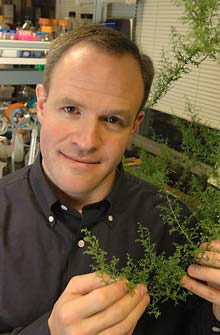
A native Nebraskan working to develop cost-effective biofuels to replace gasoline, diesel and jet fuels with a clean, renewable alternative is the final lecturer in the 2011-2012 Heuermann Lectures.
“The Bold Future of Alternative Energy” is Jay Keasling’s topic at 2:30 p.m. May 8, in Hardin Hall Auditorium.
A 2 p.m. reception in the Hardin Hall lobby precedes the lecture.
Keasling is chief executive officer of the Joint BioEnergy Institute in Emeryville, Calif. The institute is one of three Bioenergy Research Centers funded by the U.S. Department of Energy to advance developing the next generation of biofuels.
A leader in the field of synthetic biology, Keasling and colleagues at JBEI have engineered a strain of Escherichia coli bacteria to produce biodiesel fuel from biomass such as switchgrass, without the need of enzyme additives.
His team currently is working to increase the efficiency and speed by which its engineered E. coli strain can be cost-effective and economically competitive in quantities needed to meet the world need.
"With today's concerns about how petroleum-based fuels are affecting the global climate, and how increasing costs and dependence on foreign sources of petroleum-based fuels affect countries, fuels that are renewable and sustainable are vital," said Ronnie Green, Institute of Agriculture and Natural Resources Harlan vice chancellor at UNL and moderator of the Heuermann Lectures.
"We are tremendously fortunate to have this leader in the field discuss alternative energy as we end our first year of Heuermann Lectures," Green added.
A story in Discover magazine once said "Keasling spent his childhood immersed in the practical end of biology, chemistry, and engineering — he was raised on a farm" near Harvard, Neb.
It was work to save lives of malaria sufferers that provided him the insight into the work he now does with biofuels. Up to a million people, many of them children, die of malaria a year.
Using synthetic biology tools to produce a microbial-based version of the most powerful anti-malarial drug artemisinin at a price affordable to the poor, he saw ways the same synthetic biology techniques would apply to producing carbon-neutral transportation fuels from plant biomass.
Keasling received the inaugural Biotech Humanitarian Award from the Biotechnology Industry Organization in 2009 for his work in fighting malaria.
Heuermann Lectures in IANR focus on providing and sustaining enough food, natural resources and renewable energy for the people of the world, and on securing the sustainability of rural communities where the vital work of producing food and renewable energy occurs. The lectures feature diverse speakers who are working to meet the world's food and food-related challenges in a variety of fields.
Heuermann Lectures are made possible through a gift from B. Keith and Norma Heuermann of Phillips, long-time university supporters with a strong commitment to Nebraska's production agriculture, natural resources, rural areas and people.
In addition to his work at JBEI, Keasling also is the Hubbard Howe Jr. Distinguished Professor of Biochemical Engineering in the Department of Chemical and Biomolecular Engineering and the Department of Bioengineering at the University of California, Berkeley; Nanyang professor at Nanyang Technological University, Singapore; associate laboratory director of Lawrence Berkeley National Laboratory, and director of the Synthetic Biology Engineering Research Center.
He received his bachelor's degree from UNL, graduating with high distinction, and received his master's and Ph.D. at the University of Michigan. He has received numerous honors including the 2010 Presidential Green Chemistry Challenge Award from the United States Environmental Protection Agency.
Keasling is a co-author of more than 230 refereed journal articles and a partner on 14 patents.
More details at: http://go.unl.edu/eqr